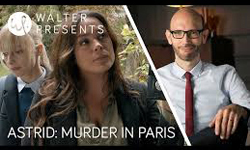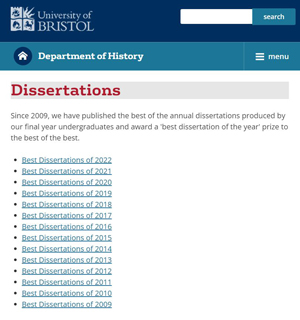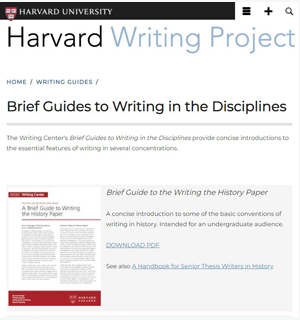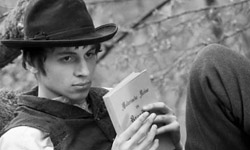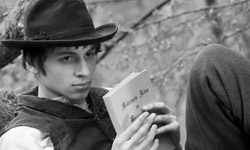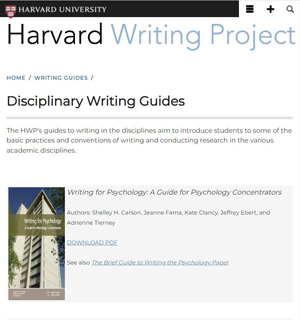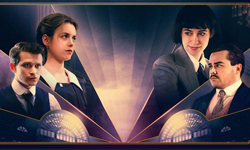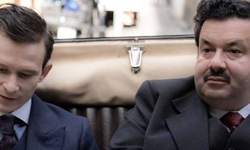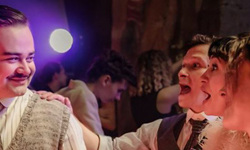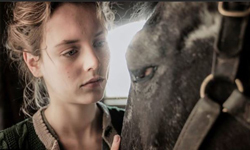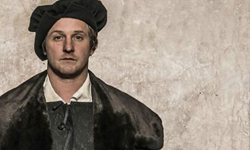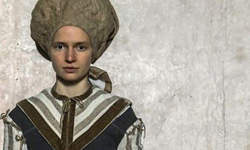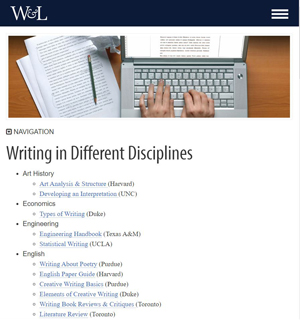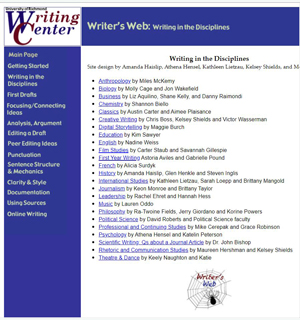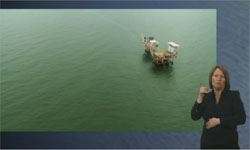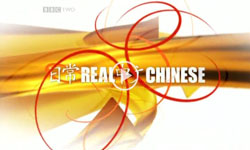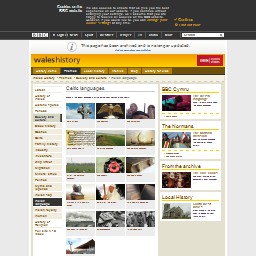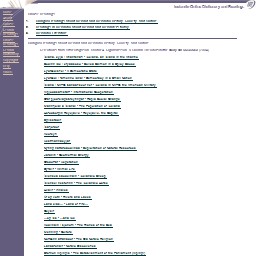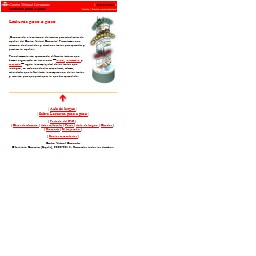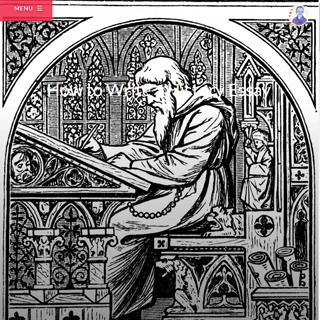Select one or more of these popular tags:
-
Astrid: Murder in Paris - Series 1 Episode 4
-
Laurent Burtin, Alexandre de Seguins , , 2019
The body of a palaeontologist is found in the Natural History Museum. What is she doing there when the forensic conclusion is that she died by drowning?
- 1.0
- English subtitles
- 51
The body of a palaeontologist is found in the Natural History Museum. What is she doing there when the forensic conclusion is that she died by drowning?
-
Best Dissertations
-
A useful collection of the best (undergraduate) dissertations from the Department of History at Bristol University organised by year.
A useful collection of the best (undergraduate) dissertations from the Department of History at Bristol University organised by year.
-
Brief Guides to Writing in the Disciplines
-
(Currently) four downloadable breif guides to writing in history, philosophy, English and psychology.
(Currently) four downloadable breif guides to writing in history, philosophy, English and psychology.
-
Die andere Heimat - Chronik einer Sehnsucht : Part 1
-
Edgar Reitz , , 2013
German historical drama. Jakob Simon dreams of emigrating from his poverty-stricken life as the son of a blacksmith in Schabbach, a village in rural Rhineland.
- 1.0
- English subtitles
- 100
German historical drama. Jakob Simon dreams of emigrating from his poverty-stricken life as the son of a blacksmith in Schabbach, a village in rural Rhineland.
-
Die andere Heimat - Chronik einer Sehnsucht : Part 2
-
Edgar Reitz , , 2013
As he studies the languages of tribal South America, the return from military service of his more worldly brother Gustav fails to break him from his daydream, but day-to-day living in Prussian feudal society means that his dreams have to be put on hold.
- 1.0
- English subtitles
- 122
As he studies the languages of tribal South America, the return from military service of his more worldly brother Gustav fails to break him from his daydream, but day-to-day living in Prussian feudal society means that his dreams have to be put on hold.
-
Harvard Writing Project
-
A collection of free downloadable pdf books explaining in detail how writing is done in different disciplines (see tags).
A collection of free downloadable pdf books explaining in detail how writing is done in different disciplines (see tags).
-
KaDeWe - Our Time Is Now
-
Julia von Heinz , , 2021
KaDeWe - a shopping paradise for Berlin's elite. Four ambitious young friends come of age in the 1920s - a time of opportunity and opulence. But storm clouds are gathering...
- 1.0
- English subtitles
- 184
KaDeWe - a shopping paradise for Berlin's elite. Four ambitious young friends come of age in the 1920s - a time of opportunity and opulence. But storm clouds are gathering...
-
KaDeWe - Our Time Is Now - Against the Clock- Series 1 - Episode 5
-
Julia von Heinz , , 2021
Hedi becomes the talk of the locker room when she becomes the face of KaDeWe. Harry and Georg plan to bamboozle potential buyer Tietz by pretending that their business is failing.
- 1.0
- English subtitles
- 46
Hedi becomes the talk of the locker room when she becomes the face of KaDeWe. Harry and Georg plan to bamboozle potential buyer Tietz by pretending that their business is failing.
-
KaDeWe - Our Time Is Now - City of Women - Series 1 - Episode 1
-
Julia von Heinz , , 2021
Harry Jandorf returns from the horrors of the Great War trenches to resume his role as advertising manager at his family’s iconic Berlin department store, only to find many changes.
- 1.0
- English subtitles
- 46
Harry Jandorf returns from the horrors of the Great War trenches to resume his role as advertising manager at his family’s iconic Berlin department store, only to find many changes.
-
KaDeWe - Our Time Is Now - Cold Withdrawal - Series 1 - Episode 4
-
Julia von Heinz , , 2021
Harry realises that he must confront his addiction head-on. Pressure mounts on his sister Fritzi to end her affair with Hedi. In German with English subtitles.
- 1.0
- English subtitles
- 46
Harry realises that he must confront his addiction head-on. Pressure mounts on his sister Fritzi to end her affair with Hedi. In German with English subtitles.
-
KaDeWe - Our Time Is Now - Lavender Nights - Series 1 - Episode 3
-
Julia von Heinz , , 2021
In Berlin, inflation soars, the workforce is starving and KaDeWe is struggling. Despite the worries, Hedi enjoys nights out at an avant-garde club called Eldorado and a liaison with Fritzi.
- 1.0
- English subtitles
- 46
In Berlin, inflation soars, the workforce is starving and KaDeWe is struggling. Despite the worries, Hedi enjoys nights out at an avant-garde club called Eldorado and a liaison with Fritzi.
-
KaDeWe - Our Time Is Now - The End of Beauty- Series 1 - Episode 6
-
Julia von Heinz , , 2021
KaDeWe again finds itself in need of financial reinvestment. Tietz, Harry and Georg approach the bank, but politics is about to play a painful part in their negotiations.
- 1.0
- English subtitles
- 46
KaDeWe again finds itself in need of financial reinvestment. Tietz, Harry and Georg approach the bank, but politics is about to play a painful part in their negotiations.
-
KaDeWe - Our Time Is Now - The Purest Pleasure - Series 1 - Episode 2
-
Julia von Heinz , , 2021
Having convinced Georg to cook the KaDeWe books, Harry accompanies his father to the bank to try to persuade them to give a substantial loan, despite the poor economic climate.
- 1.0
- English subtitles
- 46
Having convinced Georg to cook the KaDeWe books, Harry accompanies his father to the bank to try to persuade them to give a substantial loan, despite the poor economic climate.
-
Reformation - Part 1
-
ZDF , , 2017
A vivid and well-mounted German-language drama imagines what it was like in the Wittenberg of 1517 for young monk Martin Luther and his friends. It does a fine job of getting across the corruption of the church at the time: one scene sees a (literally) fiery preacher using every theatrical trick in the book to extort money from the poor. Meanwhile Luther is prevailed upon to paste his rebellious pamphlet on a church door and so lights the touchpaper on centuries of religious conflict
- 1.0
- English subtitles
- 90
A vivid and well-mounted German-language drama imagines what it was like in the Wittenberg of 1517 for young monk Martin Luther and his friends. It does a fine job of getting across the corruption of the church at the time: one scene sees a (literally) fiery preacher using every theatrical trick in the book to extort money from the poor. Meanwhile Luther is prevailed upon to paste his rebellious pamphlet on a church door and so lights the touchpaper on centuries of religious conflict
-
Reformation - Part 2
-
ZDF , , 2017
The Catholic church has excommunicated Luther and condemned him as a heretic, but the Reformation can no longer be stopped. Whilst in hiding, and widely believed to be dead, Luther translates the Bible into German for the first time so that the ordinary people can read it.
- 1.0
- English subtitles
- 90
The Catholic church has excommunicated Luther and condemned him as a heretic, but the Reformation can no longer be stopped. Whilst in hiding, and widely believed to be dead, Luther translates the Bible into German for the first time so that the ordinary people can read it.
-
Spiral Series 5 Episode 08
-
Alexandra Clert, Guy-Patrick Sainderichin , , 2014
The operation to capture Zacharie Gabbai has failed and he is now on the run. The police decide to set him a trap. Laure looks into the period in which Sandrine Jaulin's parents worked as a foster family, and a troubling history emerges.
- 1.0
- English subtitles
- 55
The operation to capture Zacharie Gabbai has failed and he is now on the run. The police decide to set him a trap. Laure looks into the period in which Sandrine Jaulin's parents worked as a foster family, and a troubling history emerges.
-
Writing in Different Disciplines
-
A collection of links to discipline-specific writing advice and help at American universities.
A collection of links to discipline-specific writing advice and help at American universities.
-
Writing in the Disciplines
-
Links to guides to writing in 24 different disciplines.
Links to guides to writing in 24 different disciplines.
-
Obama: His Story ( Signed )
-
Samanatha Anstiss
BBC correspondent Clive Myrie traces the life story of America's first black president.( Signed)
- British-Sign-Language
- History
- BSL subtitles
- 60
BBC correspondent Clive Myrie traces the life story of America's first black president.( Signed)
Stephen Fry loves Louisiana. Four months after the BP oil spill, dubbed the worst ecological disaster in the history of America, Fry returns to the Deep South together with zoologist Mark Carwardine, to see what the impact has been on the people, the vast wetlands and the species that live there.
- British-Sign-Language
- British-Sign-Language
- Natural World
- BSL subtitles
- 60
Stephen Fry loves Louisiana. Four months after the BP oil spill, dubbed the worst ecological disaster in the history of America, Fry returns to the Deep South together with zoologist Mark Carwardine, to see what the impact has been on the people, the vast wetlands and the species that live there.
Miners, nuclear scientists, politicians, environmentalists and even the City have all wrestled for control of the national electricity grid and the power that it has brought.
- British-Sign-Language
- British-Sign-Language
- Engineering
- BSL subtitles
- 60
Miners, nuclear scientists, politicians, environmentalists and even the City have all wrestled for control of the national electricity grid and the power that it has brought.
Italian for beginners, programmes 9-16. The episodes are filmed in different regions of Italy, from Rome to Florence.
- Course Videos
- Italian subtitles
- 13
Italian for beginners, programmes 9-16. The episodes are filmed in different regions of Italy, from Rome to Florence.
-
Real Chinese - 07 - Exploring History
-
BBC , 2008
A lively introduction to Mandarin Chinese in ten parts. Transcripts of the lessons can be found at:http://www.bbc.co.uk/languages/chinese/real_chinese/
- Course Videos
- No subtitles
- 15
A lively introduction to Mandarin Chinese in ten parts. Transcripts of the lessons can be found at:http://www.bbc.co.uk/languages/chinese/real_chinese/
-
Bilingual readings about Iceland and Icelandic History, Society, and Culture
Contains selections from Úlfar Bragason, Baldur A. Sigurvinsson, and Guðrún Theodórsdóttir, Carry On Icelandic (2004)
Contains selections from Úlfar Bragason, Baldur A. Sigurvinsson, and Guðrún Theodórsdóttir, Carry On Icelandic (2004)
-
Centro Virtual Cervantes (Language Classroom)
Link to the language classroom and step-by-step reading guides from the Cervantes Institute (a non-profit organization created by the Spanish government to promote the study and the teaching of Spanish language and culture). CVC is named after Miguel de Cervantes (1547–1616), the author of Don Quixote and perhaps the most important figure in the history of Spanish literature. Click the link to find a variety of fun resources to learn and practice your Spanish.
Link to the language classroom and step-by-step reading guides from the Cervantes Institute (a non-profit organization created by the Spanish government to promote the study and the teaching of Spanish language and culture). CVC is named after Miguel de Cervantes (1547–1616), the author of Don Quixote and perhaps the most important figure in the history of Spanish literature. Click the link to find a variety of fun resources to learn and practice your Spanish.
-
How to Write a History Essay
A blog post from a UCL History lecturer explaining how to write a good History essay. Much of the advice applies to other subjects too.
A blog post from a UCL History lecturer explaining how to write a good History essay. Much of the advice applies to other subjects too.
-
Khan Academy
A library of almost 3000 short videos arithmetic to physics, finance, and history with practice exercises. A very useful resource to practice your listening and note-taking skills while learning something new.
A library of almost 3000 short videos arithmetic to physics, finance, and history with practice exercises. A very useful resource to practice your listening and note-taking skills while learning something new.
-
Language Atlas
Japanese pages offering a taster of Japanese culture and language. Includes introductions to the language, history, and way of life of the Japanese.
Japanese pages offering a taster of Japanese culture and language. Includes introductions to the language, history, and way of life of the Japanese.
-
Language Atlas
Chinese Mandarin pages offering a taster of Chinese culture and language. Includes introductions to the language, history, and way of life of the Chinese people.
Chinese Mandarin pages offering a taster of Chinese culture and language. Includes introductions to the language, history, and way of life of the Chinese people.

